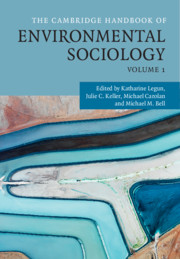Book contents
- The Cambridge Handbook of Environmental Sociology Volume 1
- The Cambridge Handbook of Environmental Sociology
- Copyright page
- Contents
- Figures
- Tables
- Contributors
- Foreword
- Introduction
- Part I Theory in Environmental Sociology
- 1 Classical Theory and Environmental Sociology: Toward Deeper and Stronger Roots
- 2 Globalizing Environmental Sociology
- 3 An Embodied Materialist Sociology
- 4 The Environmental Sociology of the Good: Nature, Faith, and the Bourgeois Transition
- 5 Microsociological Perspectives in Environmental Sociology
- Part II The Economy and Environmental Sociology
- Part III Culture and Environmental Sociology
- Part IV Politics, Power, State
- Part V Social Justice
- Index
- References
3 - An Embodied Materialist Sociology
from Part I - Theory in Environmental Sociology
Published online by Cambridge University Press: 05 November 2020
- The Cambridge Handbook of Environmental Sociology Volume 1
- The Cambridge Handbook of Environmental Sociology
- Copyright page
- Contents
- Figures
- Tables
- Contributors
- Foreword
- Introduction
- Part I Theory in Environmental Sociology
- 1 Classical Theory and Environmental Sociology: Toward Deeper and Stronger Roots
- 2 Globalizing Environmental Sociology
- 3 An Embodied Materialist Sociology
- 4 The Environmental Sociology of the Good: Nature, Faith, and the Bourgeois Transition
- 5 Microsociological Perspectives in Environmental Sociology
- Part II The Economy and Environmental Sociology
- Part III Culture and Environmental Sociology
- Part IV Politics, Power, State
- Part V Social Justice
- Index
- References
Summary
The essay outlines the emergence of 20th-century environmental sociology from within a discipline built on eurocentric masculinist presuppositions. The instrumental hegemony of 'humanity over nature' and its corollary in the capitalist division of labour disconnect people from their ground in natural processes, such that society and ecology become accepted as distinct ontological spheres. Salleh proposes a new lens, based on an understanding of embodied-nature. She argues that an embodied materialist epistemology can transcend the dualism, creating a sociology that supports democratic and ecologically sustainable outcomes.Salleh highlights regenerative labour skills, which apply a relational logic while maintaining community and protecting the biophysical infrastructure of global capital itself. Excluded from circuits of exchange value and independent of use value, this 'gifting' meta-industrial class provides metabolic-value, the integral basis of any society-nature metabolism. Salleh closes with an overview of how the epistemic communities that dominate contemporary environmental sociology articulate nature, and how they could benefit from an embodied materialist perspective.
- Type
- Chapter
- Information
- The Cambridge Handbook of Environmental Sociology , pp. 47 - 63Publisher: Cambridge University PressPrint publication year: 2020
References
- 1
- Cited by

